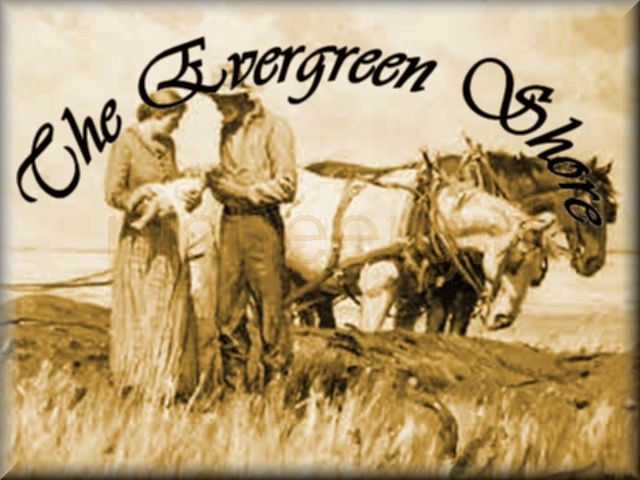“The Evergreen Shore”

 And just before Pa laid the fiddle in its box… he played a gallant, challenging tune that brought them all to their feet, and they all sang lustily… — The Long Winter, Chapter 13, “We’ll Weather the Blast”
And just before Pa laid the fiddle in its box… he played a gallant, challenging tune that brought them all to their feet, and they all sang lustily… — The Long Winter, Chapter 13, “We’ll Weather the Blast”
The Evergreen Shore was written by William Hunter and set to music by William B. Bradbury. It was first published in 1861 in Bradbury’s Golden Chain of Sabbath School Melodies (New York: Ivison, Phinney, Blakeman & Company).
William C. Hunter (1811-1877) was born in Ireland and died in Cleveland, Ohio. He came to America as a young boy, and entered Madison College in 1830. He was professor of Bible Literature in Meadville, Pennsylvania, then moved to Alliance, Ohio, to become minister of the Methodist Episcopal Church. He and his wife Ursula had seven children. He wrote over one hundred hymns and had three collections for publication prior to the outbreak of the Civil War.
William Batchelder Bradbury (1816-1868) was born in Maine and died in New Jersey. Bradbury’s father was a choir director; both his parents were excellent singers. He became skilled at every instrument he attempted, and in 1840, Bradbury began teaching music in New York, earning fame for his free singing schools and concerts performed by children. In 1847, Bradbury went to Germany to study music with the masters. He returned to go into business with his brother, a manufacturer of pianos. William Bradbury is best known as a composer and publisher of a series of musical collections. He wrote the music to “Jesus Loves Me,” a children’s Sunday School standard, and “Sweet Hour of Prayer.”
In Laura Ingalls Wilder’s Hard Winter manuscript (her working title for The Long Winter), the chapter which included Pa’s singing of “The Evergreen Shore” was originally titled “The Hurricane Roared.” Rose Wilder Lane used the first line of the chorus as the title of her serial published by Saturday Evening Post in 1932: “Let the Hurricane Roar.” It was pubished as a book in 1933, using the names of her grandparents as characters and family stories as the basis for her text. Lane wrote that “Let the Hurricane Roar” was the favorite hymn of the main character, Charles. Both Wilder and Lane used an alternate fourth line of the chorus: “On Canaan’s happy shore,” which may be the way the Ingalls family sang the song rather than incorrectly remembering the line.
1. We are joyously voyaging over the main,
Bound for the evergreen shore.
Whose inhabitants never of sickness complain,
And never see death any more.
[chorus] Then let the hurricane roar,
It will the sooner be o’er,
We will weather the blast,
And will land at last,
Safe on the evergreen shore.
2. We have nothing to fear from the wind and the wave,
Under our Saviour’s command;
And our hearts in the midst of the dangers are brave;
For Jesus will bring us to land.
3. Both the winds and the waves our Commander controls;
Nothing can baffle his skill:
And his voice when the thundering hurricane roars,
Can make the loud tempest be still.
4. In the thick murky night, when the stars and the moon,
Send not a glimmering ray,
Then the light of his countenance, brighter than noon,
Will drive all our terror away.
5. Let the high heaving billow and mountainous wave,
Fearfully overhead break;
There is one by our side that can comfort and save
There’s one who will never forsake.
6. Let the vessel be wrecked on the rock, or the shoal,
Sink to be seen never more;
He will bear, none the less, every passenger soul,
Safe, safe to the evergreen shore.
(from The Long Winter)
Then let the hurricane roar!
It will the sooner be o’er.
We’ll weather the blast
And land at last
On Canaan’s happy shore!
CLICK HERE to listen to “The Evergreen Shore” by Jerry Ernst.


“The Evergreen Shore” (TLW 13)
“Then let the hurricane roar! It will the sooner be o’er”
“We’ll weather the blast”

